Welcome to Catnapin's
Vine Gallery
Berry Vines - Grapevine Family
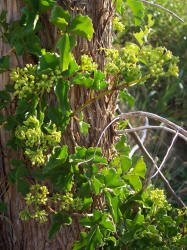
_small.jpg)
_small.jpg)
_small.jpg)
_small.jpg)
Vitaceae (Vitidaceae) - Grapevine family
Ivy Treebine (Sorrelvine, Grape Ivy, Possum Grape) Cissus trifoliata (Cissus incisa)
Fast growing vine is woody at base with tuberous roots, evergreen in warmer regions.
Warty stems (green or red) grows 20 feet long and wide. The leaves are
somewhat succulent, up to 3" long, unpleasant odor when
crushed. Leaf shape is variable: deeply notched, almost to
completely three leaflets; edges can be wavy or toothed, center is symmetric,
sides asymmetric. Tendrils are thick and coil tightly into any crevice. No thorns. Stems are green
ageing to red-brown, woody trunk in old plants. Tiny green/white flowers are
less than 1/8" wide in small clusters along a panicle 3"-4" long.
Shinny berries are green then turn black, round to ovoid, 1/4"-3/8" wide.
This plants fruit is not edible. Drought and shade tolerant.
Photos taken in Taylor County, Texas, July & September 2004
(Native of Texas, invasive - Taylor, Coleman, Brown, Coke)
Young Plant
Photos taken in Taylor County, Texas, July 2007
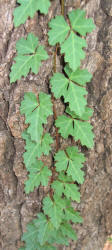
_small.jpg)
_small.jpg)
_small.jpg)
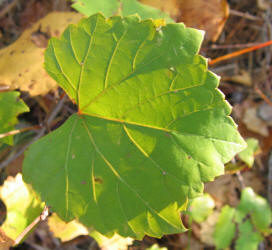
_small.jpg)
In the vine photo, the thicker vine is the grape, 1" wide.
Vitaceae (Vitidaceae) - Grapevine family
Muscadine Grape (Scuppernong Grape, Bullace Grape, Southern Fox Grape) Vitis rotundifolia
Male and female flowers on different plants. Dense panicles of small green
flowers. Fruit grows in loose clusters of up to 40 berries, 1"-1 1/2" wide,
tough skin, 5 seeds. Fruit color varies: green, bronze, pinkish-red, purple,
black. Leaves 2"-5" wide, coarsely serrated, pointed, turn yellow in fall. The bark
is non-shedding, has shoots, and unbranched tendrils. Woody vine
can grow to 100 feet long and be 6" wide. It likes warm humid
areas, not cold tolerant below 10°F.
Photos taken in Van Zandt and
Smith Counties, Texas, November 2006
(Native of east Texas - not listed in my area)
Similar Species
Mapleleaf Grape (Bush Grape) Vitis acerifolia
Woody vine that stays bushy and seldom climbs trees. Few tendrils, short. Leaves
leathery, young ones have "cob-web" hairy tops and bottom. Tops loose the hairs
as they age. Fruit black, 1/2" wide, summer.
(Native of Texas - Taylor)
Graybark Grape Vitis cinerea
Woody vine, that climes to over 30 feet. Branches have ashy gray hairs. Young
branches angled. Tendrils branched. Leaf bottom is "cob-web" hairy. Fruit,
black/purple and bitter, 1/4" wide, fall.
(Native of Texas - Brown)
Mustang Grape Vitis mustangensis
Woody vine that climbs to the top of small trees. Underside of leaves white
velvet. Fruit is 3/4" wide dark purple berries, August-September. Fruit is very
acidic and bitter.
(Native of Texas - Callahan)
Sand Grape Vitis rupestris (Vitis longii)
Low growing. Leaves similar to Muscadine but the corner points are not as
prominent, but can be prominent. Bark on old stems peals.
New growth stems green to red. Used to breed French-American hybrid grapes
or to use as grafting root stock. Does not tolerate shade or grazing. Cold
hardy.
(Native of Texas, rare - Taylor, Coke)
Frost Grape Vitis vulpina
Woody vine that climbs to the top of tall trees. Few tendrils, red. Blue/black
fruit
(Native of Texas - Brown)
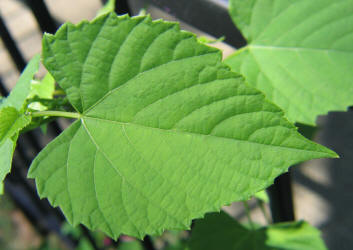
_small.jpg)
_small.jpg)
_small.jpg)
Vitaceae (Vitidaceae) - Grapevine family
? common name **zv 1** Vitis sp.
This vine appeared and was allowed to grow for only a couple months (bad location).
Leaves 3"-4" long. Long tendrils.This vine appeared and was allowed to grow for only a couple months (bad location).
Leaves 3"-4" long. Long tendrils.This vine appeared and was allowed to grow for only a couple months (bad location).
Leaves 3"-4" long. Long tendrils.
Photos taken in Taylor County, Texas, June 2007
(Native of ?)
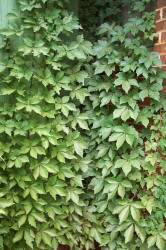
_small.jpg)
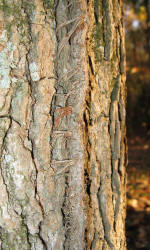
_small.jpg)
_small.jpg)
_small.jpg)
_small.jpg)
_small.jpg)
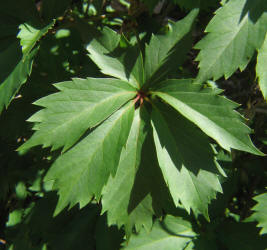
Note: the tree trunk has a thick vine firmly attached to the bark by double tendrils.
The last picture might be P. vitacea. In need to go look at its tendrils.
Vitaceae (Vitidaceae) - Grapevine family
Virginia Creeper (Woodbine) Parthenocissus quinquefolia
Vine will cover trees and walls using forked tendrils tipped in "glue", but they are
not very tight and does not hurt masonry. Leaves have 5 leaflets but can
have 3-7. Plants with 3 leaves are mistaken for Poison Ivy except for
serrated edges. It has reddish leaves in the spring and fall. Drops its
leaves in the winter. No thorns. Small green flowers produce black berries, poisonous, tastes bad.
Leaf photos taken in Taylor County, Texas, July 2004, May 2005
Vine on tree photo taken in Van Zandt County, Texas, November 2006
(Native of Texas - Taylor, Brown, Coke, Fisher)
Similar Species
Thicket Creeper Parthenocissus
vitacea
Similar to P. quinquefolia but small branching tendrils do
not have adhesive disks so can not climb brick walls, however it does climb anything it can
wrap around, to 90 feet. Dark blue berries on red stems. There are normally 5
leaflets.
(Native of Texas - Taylor, Coke)
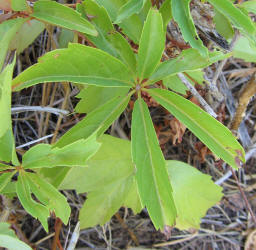
Vitaceae (Vitidaceae) - Grapevine family
Sevenleaf Creeper Parthenocissus heptaphylla
Similar to P. quinquefolia but leaflets are smaller and
narrower. There are normally 7 leaflets but can be 5-6. Turns red later than P. quinquefolia.
Tendrils do not have adhesive disks so can not climb brick walls. Flowers are
small and reddish. Dark blue berries on red stems. Likes to grow in limestone.
Leaf photo taken in Taylor County, Texas, August 2006
(Native of Texas - Taylor, Coleman, Brown)
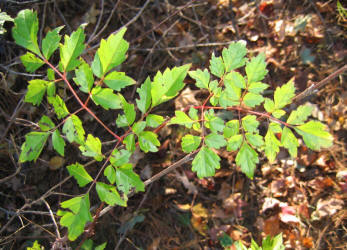
_small.jpg)
_small.jpg)
Vitaceae (Vitidaceae) - Grapevine family
Peppervine (Buckvine) Ampelopsis arborea
Tiny greenish flowers grow in loose clusters, bracts open up to a 5 pointed
star. Blooms spring through summer. Small clusters of
berries change from green to white to red to blue/black. New
flowers bloom while first fruit ripens. Shiny leaves can be
bi-pinnate or tri-pinnate. Young leaves are reddish and the tip
of the stems will have curled tendrils. Because of the few
tendrils this climbing vine tends to form dense mats of interlaced
branches. Will re-grow soon after a fire. Can become a pest.
Flower & fruit photos taken by Sonnia Hill in
Van Zandt County, Texas, July 2002
Photos taken in Van Zandt County, Texas, November 2006
(Native of east Texas - Brown)
See similar Skunkbush Sumac Fragrant Sumac
Similar Species
Heartleaf Peppervine Ampelopsis cordata
Leaf looks like a Vitis, heart shaped with flat base and pointy tip,
coarse teeth, 5" wide x 4" long. Tiny white flowers in wide clusters (true
grapes are long clusters) from node opposite a leaf. Tendrils and stems both
twine, to 25 feet. Red/purple berries on green stem, not edible.
(Native of central Texas - Taylor, Coleman, Brown)